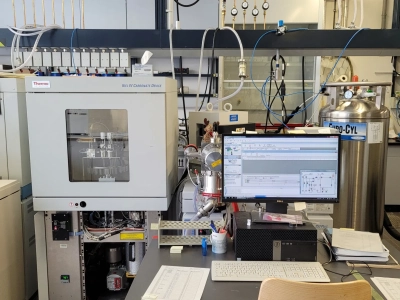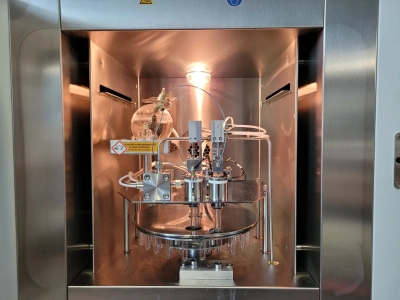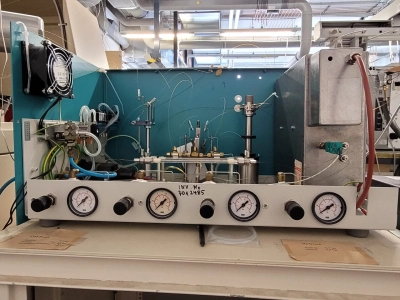- Startseite
- Unsere Infrastruktur
- Labor-Infrastrukturen
- Gas-Isotopenverhältnis-Massenspektrometer
- Mass Spectrometry on Inorganic Samples
Mass Spectrometry on Inorganic Samples
Overview
Principle
Isotope ratios are not directly measured on elemental carbon and oxygen, but inferred from measuring isotopologues of CO2. Signal intensities of mass-to-charge ratios 44, 45 and 46 reflect the abundances of 12C16O16O, 13C16O16O and 12C18O16O. δ13C is calculated from the intensity ratios of masses 45:44, and δ18O from 46:44.
Measurements are calibrated against (1) a reference gas of known isotopic composition (volcanic CO2 for carbonates, industrial CO2 for water), and (2) a carbonate standard of known composition. The carbonate standard is ground and sieved Solnhofen limestone (calcite), itself calibrated against NBS 19. For every 36 samples, 9-10 carbonate standards are measured.
Contact
|
Telefon: |
|
|
Fax: |
+49 421 218-65505 |
|
E-Mail: |
|
|
Raum: |
MARUM I, 1150 |

Carbonates
Four mass spectrometers (Finnigan MAT 251, Finnigan MAT 252, 2x ThermoFisher 253plus) are coupled to automated carbonate preparation ("Kiel") devices. Typical samples include foraminifera, corals, and bulk sediment. For marine samples, the oxygen isotopic composition is an indicator of the past ocean hydrography (temperature, salinity), while carbon isotopes reflect nutrients and ocean water mass distributions.
In the automated carbonate preparation device the sample is dissolved with phosphoric acid, and the generated CO2 gas is purified and transferred to the mass spectrometer.
The mass spectrometer is equipped with a dual inlet system, where for each sample the pressure of the reference gas is adapted to the pressure of the sample gas. This procedure reduces non-linearities of the spectrometer and hence analytical uncertainty.
Each carbonate device has a throughput of 36 samples per day (plus 9-10 standards). The combined annual throughput is approximately 14,000 samples.
Details on costs, submitting samples and general procedures are found in the Guidelines and Terms of Use ("Nutzerordnung").
Measurements of Clumped Isotopes are currently not available, the system (ThermoFisher 253plus with Kiel IV, included in the above total) has been converted back for conventional stable isotope analyses.

Sample tray, acid valves and acid reservoir of the Kiel IV carbonate device.
Water
A Gasbench II coupled to a Finnigan MAT 252 mass spectrometer is used to determine the carbon isotope composition of the DIC of water samples, typically seawater and sediment pore water. In seawater, δ13C of DIC reflects primary productivity in surface waters, and the degradation of organic matter in deep waters.
Phosphoric acid is added to the sample, forcing all species of dissolved inorganic carbon (CO2, HCO3-, CO32-, and undissociated H2CO3) to degas as CO2. The latter is then transferred to the mass spectrometer.
Daily throughput is 48 samples (plus 12 standards).
Details on costs, submitting samples and general procedures are found in the Guidelines and Terms of Use ("Nutzerordnung").

Gasbench II


